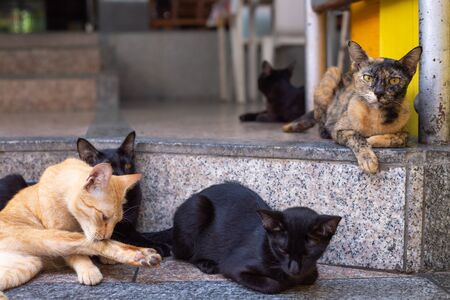Introduction: Feline Friends in Urban India
In the heart of Indias vibrant cities, where the sounds of honking rickshaws blend with the distant call of chaiwalas, a quiet revolution is unfolding within the walls of high-rise apartments. More and more urban dwellers are opening their doors—and their hearts—to furry companions, especially cats and dogs. As a proud cat parent myself, I see firsthand how these whiskered wonders transform small spaces into cozy homes, offering comfort amidst the city’s chaos. This growing trend of pet ownership brings immense joy but also presents unique challenges for residents navigating apartment life in a culturally rich and diverse society like ours. From negotiating with housing societies to understanding legal rights, pet owners often find themselves balancing tradition, modernity, and the unconditional love of their loyal pets.
2. Legal Framework: What the Law Says about Pets in Apartments
In India, sharing your apartment with a beloved furry friend is more than just a lifestyle choice—it’s also protected by law. While every cat and dog brings warmth to a home, pet parents sometimes face misunderstandings or resistance from Resident Welfare Associations (RWAs) or neighbors. Let’s gently explore the legal provisions that ensure your right to keep pets in apartments, weaving through acts, guidelines, and landmark judgments with the same patience we show our curious kittens.
Animal Welfare Laws
The Prevention of Cruelty to Animals Act, 1960, is the central law that protects animals in India. It assures that no animal, including those living in apartments, is subjected to unnecessary pain or suffering. This act forms the backbone for all subsequent guidelines and rulings regarding pet ownership.
Resident Welfare Association (RWA) Rules
Many RWAs attempt to frame their own rules about keeping pets, but it’s important to remember that these cannot override national laws or fundamental rights. As per advisories from the Animal Welfare Board of India (AWBI), outright bans on pets are not legally enforceable.
| Aspect | Legal Position |
|---|---|
| No-Pet Clauses in By-Laws | Not legally valid; RWA cannot ban pets altogether. |
| Restrictions on Breeds/Sizes | Cannot discriminate based on breed or size alone. |
| Use of Lifts/Common Areas | Pets cannot be banned from using lifts or common spaces. |
| Nuisance Complaints | If a pet causes genuine nuisance (e.g., persistent barking), RWAs can mediate but cannot evict the pet outright. |
Court Judgments Supporting Pet Owners
Cats love sunny windowsills and dogs adore grassy patches—fortunately, Indian courts recognize their place in our lives. The Delhi High Court and several other courts have upheld that housing societies cannot create blanket bans on pets. Instead, they encourage RWAs and pet owners to work together for harmonious co-existence.
Key Guidelines from AWBI
- Punitive actions like fines or eviction for keeping pets are not allowed under law.
- Puppies and kittens born on premises are not considered stray animals—they’re protected too!
- Pet parents must ensure vaccination and hygiene but cannot be asked to abandon their animals.
This compassionate legal framework means that as long as we nurture our pets responsibly—keeping tails wagging and purrs content—we have every right to call them family within our homes. Understanding these gentle yet firm protections helps us advocate for our four-pawed companions with confidence and care.
![]()
3. Common Challenges Faced by Indian Pet Parents
Living in an apartment with your beloved cat or dog in India can be a real adventure—sometimes more like a game of hide and seek! As devoted pet parents, we often face practical challenges that test both our patience and our love for our furry companions. Let’s curl up together and purr over some of the most common hurdles Indian pet owners encounter.
No-Pet Policies: “No Entry” Signs for Our Whiskered Friends
Many housing societies and apartment complexes in India still enforce strict no-pet policies. Imagine moving into a new home with dreams of lazy afternoons with your tabby only to be told, “Sorry, pets not allowed.” These rules can be emotionally distressing for pet lovers who see their animals as family members. Sometimes, cat parents have to sneak their quiet felines in and out, tip-toeing past nosy neighbors, hoping the soft jingle of a collar doesn’t give them away!
Breed Bans: Discrimination Against Certain Doggos
Some Resident Welfare Associations (RWAs) impose bans on specific dog breeds, often labeling them as “dangerous” without proper understanding. For instance, Indian pet parents with Rottweilers, German Shepherds, or even large Indies (our lovely Desi dogs!) may face unfair restrictions or outright refusals from society management. This can be heartbreaking—after all, every pup deserves a loving home, regardless of breed.
Neighborly Concerns: The Battle of Barks & Meows
Let’s not forget the never-ending saga with neighbors! Common complaints include barking at odd hours (even if your pup is just protecting his territory), fur shedding in common areas, and worries about allergies or hygiene. Sometimes, a cat’s midnight zoomies or a dog’s excited greeting can ruffle feathers (and not just the pigeons outside!). Many Indian pet parents find themselves apologizing repeatedly or having to mediate between their pets and anxious neighbors.
Relatable Example: The Curious Cat and the Auntie Next Door
Picture this: Your curious kitty slips out onto the balcony and gives a friendly meow to Mrs. Sharma next door. Instead of delighting in those emerald eyes, she complains to the management about “wild animals” prowling the premises! It’s moments like these that remind us how much work goes into educating our communities about responsible pet parenting and harmonious co-existence.
Paws and Patience: Finding Middle Ground
Despite these challenges, many Indian pet parents find creative solutions—like attending society meetings to voice their concerns or forming WhatsApp groups for fellow animal lovers. With gentle persistence and empathy (plus maybe some homemade samosas for negotiation!), it’s possible to create friendlier spaces for both humans and their precious four-legged family members.
4. Know Your Rights: Protecting Your Furry Companion
As a devoted cat parent in India, your heart beats for the soft purrs and gentle headbutts of your whiskered friend. But what happens when your apartment complex or Resident Welfare Association (RWA) raises objections to your feline companion? Thankfully, Indian law is on your side, offering protection and clarity for pet lovers like us. Let’s gently explore what these rights mean for you and your precious kitty.
Your Legal Rights as a Pet Owner
The Animal Welfare Board of India (AWBI) and various court judgments have established that keeping pets is a fundamental part of the right to life under Article 21 of the Indian Constitution. RWAs cannot enforce complete bans on pet ownership—yes, even if they claim “no pets allowed” in their by-laws! Here’s a quick look at some key legal protections:
| Right | Description |
|---|---|
| No Blanket Bans | RWAs and societies cannot impose total bans on pets in apartments. |
| Access to Common Areas | Your cat (and other pets) are allowed access to lifts, parks, and common spaces, provided they do not cause nuisance or harm. |
| No Discrimination | Discrimination based on pet breed or size is not permitted. |
| Vaccination & Registration | Pawrents must ensure their pets are vaccinated and registered as per local municipal rules. |
| Noise & Cleanliness | You are responsible for ensuring your pet does not disturb neighbors or dirty shared areas. |
How to Assert Your Rights with Kindness (Cat Style!)
If you find yourself facing resistance from your society committee, remember—approach matters as gracefully as a cat tiptoeing along a windowsill. Open communication is key! Here’s how you can assert your rights respectfully:
- Stay Calm: Address concerns politely, bringing official AWBI circulars or municipal guidelines to meetings.
- Educate: Share knowledge about responsible pet ownership; sometimes neighbors just need reassurance that your fluffy friend won’t cause trouble.
- Build Allies: Connect with other pet parents in your society. There’s strength in numbers—and perhaps even a little meow solidarity!
- Document Everything: Keep records of communications and any incidents. If things escalate, this will help support your case.
- Mediation First: Try resolving issues amicably before considering legal steps. Remember, peaceful coexistence is the goal—for both humans and felines alike!
When we respect our neighbors while gently standing up for our furry family members, we create a harmonious environment where every purr and paw step is welcome. After all, isn’t home where your cat sprawls contentedly in the sun?
5. Finding Harmony: Building a Pet-Friendly Community
In the colourful tapestry of Indian apartment life, weaving harmony between pet parents and non-pet neighbours can be as delightful as a kitten’s purr—if approached with empathy and understanding. As our whiskered companions fill our homes with joy, it’s important to nurture mutual respect within the community. Here are some thoughtful suggestions for fostering coexistence and building a truly pet-friendly environment.
Open Conversations: The First Step
Start by initiating gentle dialogues with your neighbours about your furry friends. Many misunderstandings stem from lack of communication. Share information about your pet’s nature, habits, and the steps you take for their care. Invite questions and express your willingness to address any concerns. In Indian society, where relationships often bloom over chai and friendly chats, these conversations can go a long way in building trust and dispelling fears.
Responsible Pet Parenting: Setting an Example
As devoted pet parents, it is our dharma (duty) to ensure our pets are well-behaved members of society. Always clean up after your pet in shared spaces, use leashes in common areas, and ensure vaccinations are up to date. Grooming your pets regularly not only keeps them healthy but also reduces shedding—a thoughtful gesture for allergy-prone neighbours. When you show consideration, it inspires others to appreciate your love for animals.
Community Guidelines: Co-Creating Solutions
Work together with your Resident Welfare Association (RWA) or housing society to frame clear guidelines that protect both pet owners’ rights and community interests. Participative meetings—perhaps over samosas and sweets—can help address issues like designated pet relief zones or timing restrictions for walks. Remember, inclusive policies crafted with inputs from all residents have a greater chance of success and acceptance.
Cultural Sensitivity: Respecting Traditions
India is rich with diverse customs; some neighbours may have religious or cultural reasons for discomfort around certain animals. Listen with empathy and try to find middle ground—such as keeping pets away from specific prayer areas or festivals when needed. A little sensitivity makes everyone feel valued.
Celebrating Together: Furry Festivals
Organise community events like ‘Pet Mela’ or ‘Paw-Meetups’, where neighbours can interact with pets in a fun setting. These gatherings break down barriers, spark friendships, and help children learn compassion early on. You’ll be surprised how many dog biscuits (and hearts!) are exchanged at such events.
Togetherness is Key
The journey to a harmonious living space is paved with kindness, dialogue, and shared responsibilities. When we look out for each other—and our four-legged family—our apartments become not just houses, but true homes filled with love and understanding.
6. Resources for Indian Pet Owners
Living with our beloved furry (and sometimes feathery!) companions in Indias bustling apartments can feel like a soft purr against the noise of city life. Yet, when challenges arise—whether from housing societies, neighbors, or simply navigating our rights as pet parents—knowing where to turn is as comforting as a cats gentle nuzzle. Here’s a lovingly curated list of organizations, legal resources, and support networks that every Indian pet family should know about.
Animal Welfare Board of India (AWBI)
The AWBI is the country’s official body for animal welfare matters. They offer guidance on pet ownership rights and often step in during disputes between pet owners and housing societies. Their helpline and official website provide information about relevant laws and complaint procedures.
People For Animals (PFA)
PFA is one of India’s largest animal welfare organizations. Besides rescuing animals, they also assist with legal advice for pet owners facing issues in apartments or gated communities. Reaching out to your local PFA branch can open doors to compassionate legal intervention.
Cupaa and Local NGOs
Compassion Unlimited Plus Action (CUPAA) and many other local NGOs across cities like Mumbai, Delhi, Bengaluru, and Chennai offer support groups, counseling, and mediation for pet-related housing issues. Many also host online forums where you can share experiences and seek advice from fellow pet parents.
Legal Hotlines and Online Portals
Websites such as Vakilsearch or Legal Service India feature dedicated sections on animal laws, tenant rights, and how to draft legal notices if your rights are infringed upon. Some even provide free initial consultations.
Resident Welfare Associations (RWAs) Support Groups
Connecting with other pet owners within your RWA or apartment association can be invaluable. Many cities now have WhatsApp groups or Facebook communities where residents share updates about rules, events, or legal victories related to pets.
Social Media Advocacy Networks
If you’re feeling isolated or unheard, platforms like Instagram, Twitter (X), and Facebook are home to passionate pet advocacy pages run by Indian animal lovers. These communities often amplify stories of injustice, mobilize public support, and connect you with experts who can help resolve disputes peacefully.
Remember, dear hooman: You are not alone in this journey. With these resources at your paw-tips, you and your whiskered roommates can enjoy harmonious apartment living—protected by both love and law.
7. Conclusion: Cherishing Our Companions in Every Home
As we come to the end of our discussion on the legal rights of pet owners in Indian apartments, it is worth pausing to reflect on the profound bond we share with our animal companions. In countless homes across India, cats curl up by window sills and dogs wag their tails in cheerful anticipation—reminding us every day that a house becomes a true home only when filled with love, warmth, and gentle purrs or happy barks.
Living in an apartment should never mean living without our beloved pets. Laws and regulations are slowly recognizing this truth, but as communities, it’s upon us to nurture empathy and kindness towards both our furry friends and our neighbours. After all, respecting the rights of pet owners isn’t just about following rules; it’s about celebrating the joy and comfort that animals bring into our lives.
For us cat lovers (and dog lovers too!), every whisker twitch and soft meow is a daily reminder that compassion has no boundaries—not even the walls of an apartment. Let us strive to create spaces where every paw print is cherished, and every heart—human or animal—feels safe and welcome.
So, whether you are a proud pet parent or someone learning to appreciate the quiet companionship of your neighbour’s tabby, let us carry forward this spirit of harmony. May every Indian household be blessed with kindness, understanding, and the gentle magic that only our pets can bring.


